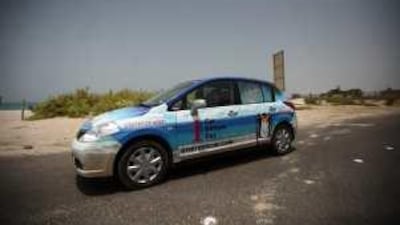If you don't mind driving an advertisement on wheels, you can rent a car in the UAE for just Dh1 a day. "Clients didn't believe it at first," said Hakim Gouasmia, the chief executive of One Rent Car. "Not until they got into the car, drove off and waved back at us."
Never mind the customers - other car rental companies couldn't believe it either. "You must be kidding. How is it even possible?" was the reaction at one well-known firm. There is, of course, a catch: customers must agree to drive an average of at least 70km a day or pay Dh5 for every kilometre they fall short of that. Drivers also have to pay a Dh60 annual membership fee to be able to rent the cars and leave a Dh2,500 deposit, from which salik and other expenses will be deducted when the car is returned.
Luella Kay, the general manager at One Rent Car, said the service was "something that works for everyone ... It is almost community service-oriented - fun and enjoyable for the community." One Rent Car charges the advertisers an average of Dh3,000 per "branded" car per month. The company designs the eye-catching advertisements that cover the entire car except for the windscreen and front side windows and applies them to its vehicles in-house.
Customers can pick up a branded car from the company's office in Sharjah or have it delivered to them for a fee of Dh100 in Ajman or Umm al Qaiwain, Dh150 in Dubai, Ras al Khaimah, Fujairah and Al Ain and Dh250 in Abu Dhabi. After launching the scheme in January, One Rent Car now has 92 branded cars for rent. Ms Kay said this form of advertising reflected modern life. "It is like telling people you are new, modern and forward-thinking, without actually telling them because it instantly portrays that image."
The ads are effective too, she said. "Each car gets an average of 50,000 contacts per day. So at the end of the month there are about 1.5 million people who have seen the advert and have interacted with the company that is advertising." Meanwhile, the dirham-a-day rental is particularly attractive because of the tough economic times. Some customers for the branded cars have been laid off or are unable to get financing to buy a car. "When things like this [the economic slowdown] happen, it really inspires innovation," Ms Kay said.
Some, however, rent the branded cars solely for the fun of it. Ali Hamze, 26, of Lebanon, has been renting one for two months now. He owns a car but prefers to drive the colourful rental because he enjoys the attention it gets. "People keep looking at you and some want to talk to you," he said. "You feel like a famous actor." Hamda al Abbar from Dubai said she thought it would be amusing to drive one of the distinctive cars.
"I would do it for the fun of it, even if I had my own car," she said. The National took a branded car out on the streets of the capital for a day and it got a lot of attention. Not everyone likes the idea. "Why would I advertise for somebody else?" said Siham al Safyani from Morocco. "They should pay us to advertise for them instead." Others said they would only rent a branded car if their own vehicle was being repaired, while a few, like Mohamed Shawar from Egypt, said it would depend on where they were driving it.
"I would rent it with my friends, but I wouldn't drive it to work, that's for sure," he said. Ms Kay said most customers for the branded cars were between the ages of 25 and 35 and earned between Dh9,000 and Dh12,000 a month. She said there was also a high interest in renting the cars among Emiratis, which was initially unexpected. "We are now widely supported by the local market," she said. The company also customises cars with personal messages, including birthday wishes or even marriage proposals. This service costs between Dh1,500 and Dh5,000, depending on the work involved and the duration of the rental.
Ms Kay said she enjoyed seeing people's reactions when they came in for a branded car. "To children, it is like being able to sit in a big toy. It's fantastic."

